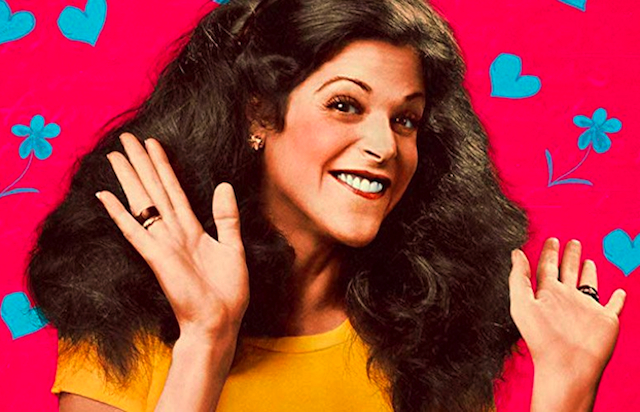CHICAGO – In anticipation of the scariest week of the year, HollywoodChicago.com launches its 2024 Movie Gifts series, which will suggest DVDs and collections for holiday giving.
Gilda Radner Becomes Live Again in ‘Love, Gilda’
- 1975
- Bill Murray
- Chevy Chase
- Dan Aykroyd
- Detroit
- Gilda Radner
- HollywoodChicago.com Content
- Jane Curtin
- John Belushi
- Lorne Michaels
- Lorraine Newman
- Love Gilda
- Movie Review
- National Lampoon Radio Hour
- Original Cast
- Patrick McDonald
- Roseanne Roseannadanna
- Saturday Night Live
- SNL
- The Second City
- Toronto
 Rating: 4.5/5.0 |
CHICAGO – It’s always something, as the great Gilda Radner often said (through her character Roseanne Roseannadanna), and the documentary “Love, Gilda” is about all her somethings… her childhood, the early comedy days, the rise through “Saturday Night Live” and her succumbing to the dread disease of cancer. She had it all, did it all, but as always “it” could not save her, and eventually us.
The title refers to her extraordinary archive of letters (signed off as Love, Gilda) and journal entries, which chronicle her life and times, but which also coincided with the second wave of feminism and the female comedy force that followed, and Gilda was a force all of her own with the original 1975 cast of “Saturday Night Live.” Often these types of celebrities emerge from their most famous performances, but Gilda had just as fascinating a non-celebrity life before the fame, with a circuitous route to her notoriety. Yep, it’s always something.
Gilda Susan Radner was born in Detroit, Michigan, to a well-off family (her father owned and operated hotels) and was raised primarily by a nanny she called Dibby, who encouraged her active imagination. Plagued with eating disorders as an overweight child, she outgrew the weight but not the psychology of that mindset, by the time she enrolled at the University of Michigan in the mid-1960s.

Gilda Susan Radner of Detroit, Michigan, in ‘Love, Gilda’
Photo credit: Magnolia Pictures
Radner was often mistaken for Canadian, because she quit UofM to follow a boyfriend to Toronto. The relationship didn’t last, but her beginnings as a performer began in the Great White North, and she eventually joined The Second City of Toronto as a featured player… which included Dan Aykroyd, John Candy and Eugene Levy. This connection led to a job in New York City in the early 1970s, which eventually landed her at Saturday Night Live.
The rest of the story involves her post “SNL” career, and that was about her marriage to actor Gene Wilder and the ovarian cancer that she died from in 1989 (at age 42). But that disease could not kill the spirit of her. Several prominent woman comic actors read from her writings in the film, including Amy Poehler and Maya Rudolph, who directly credit Gilda as their inspirations. The bio doc is filled with Radner’s famous characters and sketches, as fresh today as they were 40 years ago.
Her early years were as fascinating as the fame years. The various psychological scars of being overweight and experiencing the death of her father as a child – and her isolation as a result – formulated the performer she became. And she always characterized her career as accidental… she said she was just going for the “next job” when it came to her ascension up the show biz ladder. Contemporaries like Martin Short, Chevy Chase, Laraine Newman and Lorne Michaels fill in those parts of the story, always with a deference to her extreme talent.

It’s Always Something: As Roseanne Rosesannadanna in ‘Love, Gilda’
Photo credit: Magnolia Pictures
Director Lisa Dapolito constructs Gilda’s story as an emotional ride, from her early childhood difficulties to the sometimes overwhelming fame, and finding love with Gene Wilder to becoming the first public figure to come front and center with her cancer. Because Gilda was a journal keeper, most of the film is through her own words (and she also did the audiobook of her autobiography). It is most comforting to see the sketches again, and hear that sunny voice of hers remind us that all lives are hard, even if on the surface it doesn’t seem that way.
“Why can’t we make Puerto Rico a steak?” she once asked as her addled character Emily Litella. You can’t get more contemporary than that, as food supplies are still an issue in hurricane-ravaged PR. What, she really meant “make Puerto Rico a State?” Well, never mind.
 | By PATRICK McDONALD |


